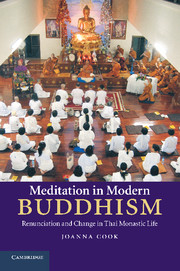Book contents
- Frontmatter
- Contents
- Acknowledgements
- List of map and figures
- Notes on language
- Map 1 Map of Thailand
- 1 Meditation and monasticism: making the ascetic self in Thailand
- 2 Meditation and religious reform
- 3 The monastic community: duty and structure
- 4 Meditation as ethical imperative
- 5 Language and meditation
- 6 Monastic duty, mindfulness and cognitive space
- 7 Money, mae chee and reciprocity
- 8 Hierarchy, gender and mindfulness
- 9 Monasticization and the ascetic interiority of non-self
- Appendix: Ordination transcript for an eight-precept nun (mae chee)
- Bibliography
- Index
6 - Monastic duty, mindfulness and cognitive space
Published online by Cambridge University Press: 03 May 2011
- Frontmatter
- Contents
- Acknowledgements
- List of map and figures
- Notes on language
- Map 1 Map of Thailand
- 1 Meditation and monasticism: making the ascetic self in Thailand
- 2 Meditation and religious reform
- 3 The monastic community: duty and structure
- 4 Meditation as ethical imperative
- 5 Language and meditation
- 6 Monastic duty, mindfulness and cognitive space
- 7 Money, mae chee and reciprocity
- 8 Hierarchy, gender and mindfulness
- 9 Monasticization and the ascetic interiority of non-self
- Appendix: Ordination transcript for an eight-precept nun (mae chee)
- Bibliography
- Index
Summary
As we saw in Chapters 4 and 5, the powerful experiences engendered in meditation effect, and are intended to effect, a change in the meditator. In this chapter I will begin to explore the way in which these changes are articulated and embodied by monastics in the wider context of intersubjective relationships. Thai monastic life is replete with compelling moral and personal concerns. The performance of religious identity is one means by which the moral self is formed and communicated. This occurs amidst considerations of vested interests, self-esteem and duty. Through ascetic practice monastics intend to detach from a sense of self. They further have a duty to behave appropriately for the laity. In this chapter I shall examine why this is, and how it can be that behaviour may be an actualization of the Buddhist principle of non-self and a duty to others, as well as a question of social hierarchy and judgment. If in embodying ‘non-self ’ monastics no longer count for themselves then what would it matter how they behaved or how they were judged in terms of social roles and statuses? If the self does not matter then why labour to mould it? As a monastic why does one have a duty to behave in a certain way? And, why concern oneself with the moral state and idiosyncratic matters of other people, if their selves do not matter either?
- Type
- Chapter
- Information
- Meditation in Modern BuddhismRenunciation and Change in Thai Monastic Life, pp. 116 - 134Publisher: Cambridge University PressPrint publication year: 2010



